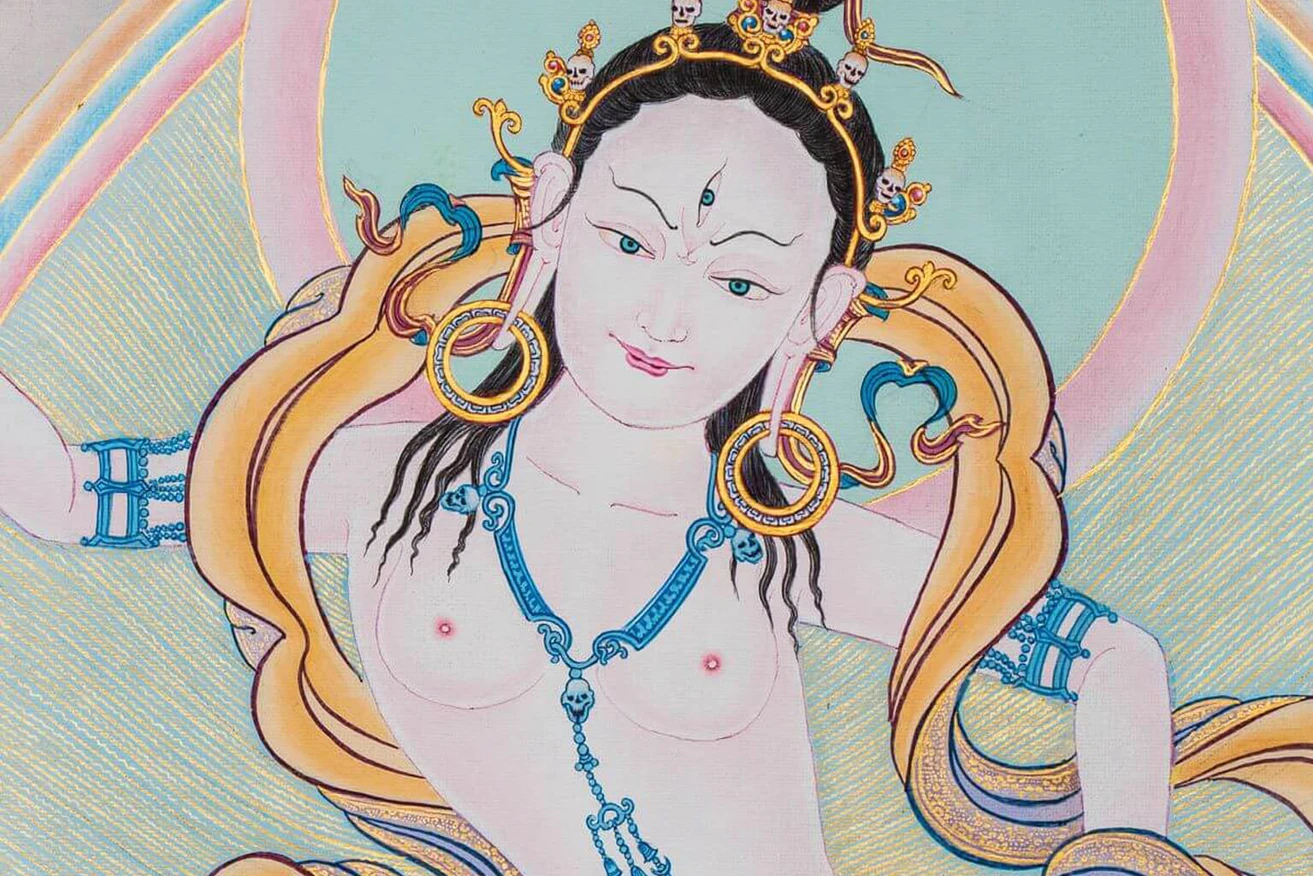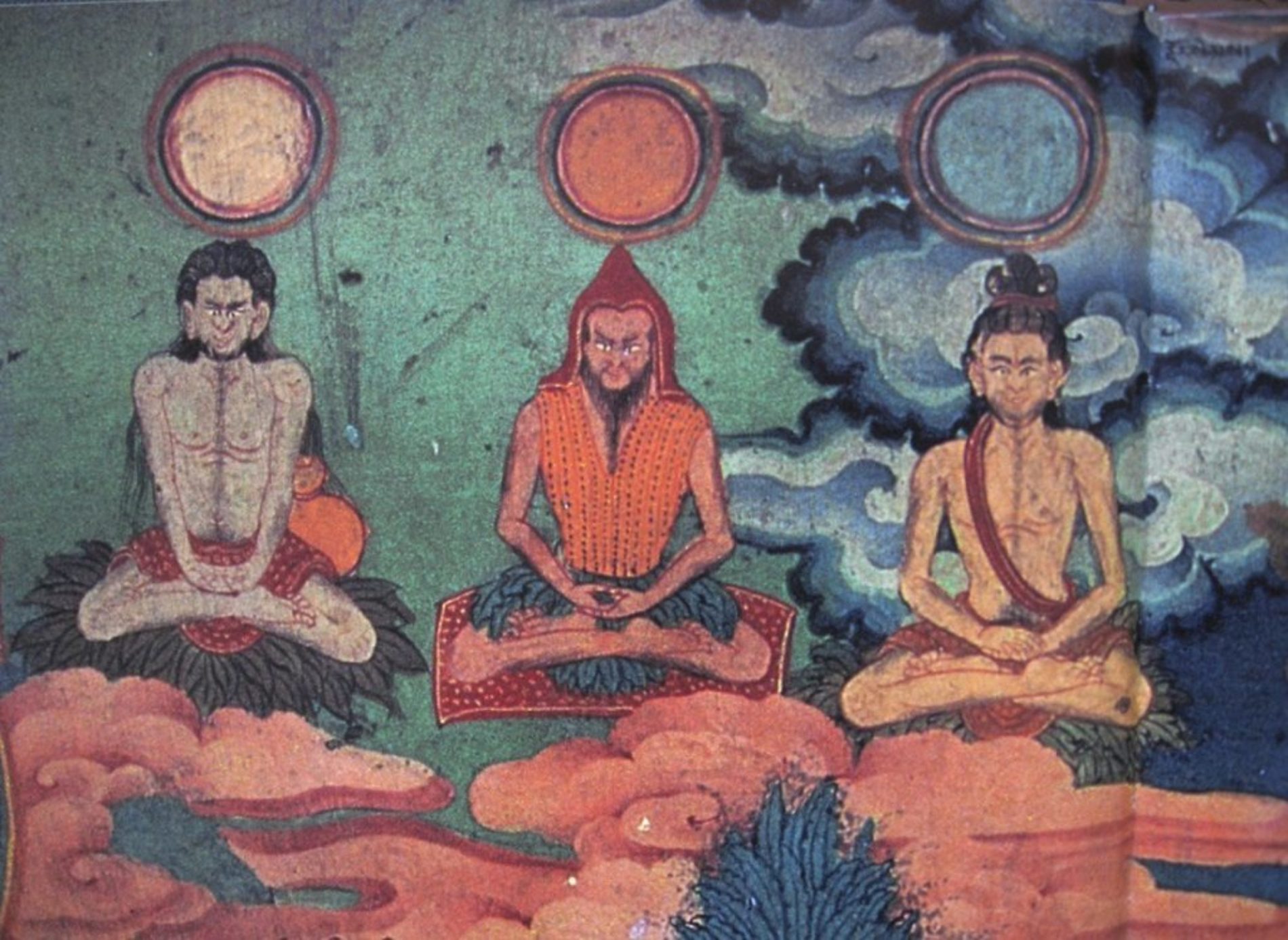The Tibetan term “chöd” translates to “cutting off” or “slaying.” It refers to a traditional Buddhist practice where individuals offer their own bodies to frightening demons. Through Chöd, practitioners aim to break free from self-centeredness and the belief in a fixed, independent identity.
Chöd involves symbolically offering one’s body, often through visualization, music, and chanting, to various beings like Buddhas, dakinis, deities, and demons. This act serves to settle karmic debts and address the root causes of suffering within the cycle of existence (samsara), such as obscurities and hindrances. By releasing attachment to the body, a major source of attachment, practitioners seek liberation from self-centered attitudes.
The Founder of Chöd: Machig Labdron
Developed by the great Tibetan yogini Machig Labdron (1055–1145), and the only practice that made its way back to India from Tibet, it is an extremely effective and quick tantric method for attaining realizations on the path to enlightenment.
Machig Labdrön, an 11th-century Tibetan yogini, revolutionized Tibetan Buddhism through her teachings and practices of Chöd, significantly impacting all its schools. As a rare female Tibetan master, she diverged from the traditional male, Indian Buddhist norm, inspiring generations with her story as a dedicated practitioner, teacher, mother, and lineage founder. Born from the tears of Avalokiteshvara‘s left eye, Machig’s conception was marked by auspicious signs, including the appearance of the syllable AH on her forehead, denoting her as a dakini. From an early age, supported by her family, she delved into spiritual pursuits, displaying remarkable knowledge and recitation skills. Her encounter with Kyotön Sonam Lama propelled her beyond mere conceptual understanding, leading her to renounce worldly comforts and embrace a life of asceticism.
At the Red House of Copper Mountain, established in her mid-thirties, Machig’s teachings flourished, attracting learned practitioners from across Tibet. Visionary experiences, including encounters with Tara and dakinis, further affirmed her spiritual lineage. Her children, integral to her legacy, became key holders of her teachings. Machig’s fame even reached India, where she astounded scholars with her profound wisdom and elucidated past lives. Despite invitations to teach in India, she remained steadfast in her commitment to Tibet. Machig’s passing at the age of 99 marked the end of an astounding life, leaving behind a legacy that continues to inspire practitioners worldwide.
Chöd: Practice, and Benefits
In Chöd, practitioners engage in acts of generosity with the aim of cutting through ego attachment. Deliberately venturing into unsettling places like cemeteries at night, they visualize offering their bodies. However, during Chöd practice, alternative offerings are also acceptable, such as a simple poem, words of encouragement, acts of kindness, or even imagined gifts.
Since scary locations evoke fear and attachment to the physical form, the act of offering directly challenges the ego. Various guests, representing diseases, fears, and demons, are invited to this symbolic feast. As practitioners maintain the perspective of three-fold emptiness, they offer their bodies as nectar to satisfy all desires. The intensity of offering one’s body in such daunting settings aims to propel practitioners into a state devoid of clinging.
As you may have gathered, the essence of Chöd practice lies in the cultivation of generosity.
Practice of Generosity
The practice of Chöd is essentially a practice of generosity. Start with small gestures—offer your time, words of encouragement, donations, or assistance. Reflect on your motivations, the sensations experienced, and the responses of others.
There’s a tale of a man who believed he couldn’t practice generosity as he had nothing to give away. The Buddha advised him to begin by simply transferring a piece of fruit from one hand to the other. By observing how it felt to relinquish the fruit and receive it, the man gradually experienced the joy of giving and receiving. Eventually, he became a renowned benefactor.
Through Chöd practice, one gains insight into their true nature and develops an awareness of the “I” as an object of ignorance. Recognizing the falseness of the “I,” practitioners employ logical reasoning to understand its dependent origination and mere imputation.
How to start practicing Chöd?
To initiate your Chöd practice, begin by setting aside dedicated time each day for meditation and reflection. Find a quiet and comfortable space where you can sit undisturbed. Start by focusing on your breath, allowing your mind to settle and your body to relax. As you cultivate a sense of inner calm, visualize yourself surrounded by a radiant light of compassion and wisdom.
Next, incorporate the recitation of Chöd prayers or mantras into your daily routine. These sacred chants serve to align your mind with the compassionate energies of Chöd practice. You can start with shorter sessions and gradually increase the duration as you become more accustomed to the practice.
Another technique is to engage in visualization exercises inspired by Chöd teachings. Imagine yourself in terrifying environments, such as graveyards or desolate landscapes, and visualize offering your body to fearsome beings and obstacles. As you confront these inner and outer challenges, cultivate a sense of fearlessness and compassion.
Additionally, consider incorporating acts of generosity and kindness into your daily life, following the principles of Chöd practice. Look for opportunities to offer assistance, support, and compassion to others, whether through material gifts, emotional support, or simply lending a listening ear.
Throughout your Chöd practice, maintain mindfulness and introspection, regularly reflecting on your motivations, experiences, and insights gained. By integrating these techniques into your daily routine with dedication and sincerity, you can begin to experience the transformative power of Chöd practice in your life.
Further Reading:
Feeding your demons by Lama Tsultrim Allione – click here
The Practice of Generosity – click here
“Buddhahood cannot be attained elsewhere. If you seek it outside yourself, even the efforts of countless eons will fail to bear any fruit. Search not, strive not. Let your mind rest in its natural state.”
Machig Labdrön




